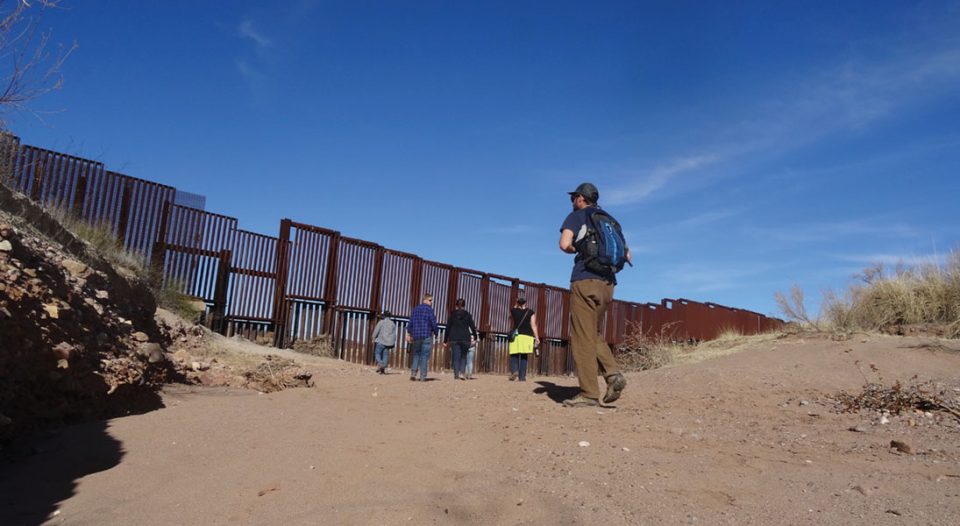Build a wall. Welcome all. Deport 11 million immigrants living illegally in America. Create a path to citizenship for those who are undocumented.
In the United States, presidential campaigns increase the chatter—and this year may have reached new highs in contentious, sometimes violent, debates—about immigration.
Some of this rhetoric revolves around Mexico. The number of Mexican citizens coming to America has dropped annually for about the last decade, according to the Pew Research Center, but about half of all undocumented immigrants, and more than a quarter of documented immigrants, are from Mexico.
Immigration and migration are abstract issues for many U.S. Americans who are unaware of the impact policy decisions have on families in Mexico—something Hannah Smith, Alyssa Kaplan and Josh Stallings have learned in their time with the ELCA Young Adults in Global Mission (YAGM) program. They, along with more than 70 other 20-somethings, are finishing their year of service with the program, which pairs young adults with ELCA companion churches and organizations in 11 countries.
Each country has needs, but only Mexico deals as closely—geographically and politically—with the U.S. Living in these communities has taught these three young adults lessons about what’s happening on the border and how things might change in the future.
Actively listen
For her year with YAGM, Smith is living in Cuetzalan but serving the nearby community in Ayotzinapan, where she teaches English and works on projects for a library. As rewarding as the experience has been, she said border relations frustrate her.
“We need to find a better way to deal with issues surrounding immigration,” she said. “I would challenge people to look beyond their political beliefs and ask themselves why so many people are forced to migrate from their homes. Once you reach the root of this issue, it becomes clear that the blame cannot be placed on our neighbors—that they are not the criminals here.”
Smith said it’s important to understand that immigration is a humanitarian issue, not a political one.
“We are so quick to jump down people’s throats and rarely take the time to actively listen, also known as listening without necessarily having the intent to immediately respond or refute or initiate debate,” she said. “During this year of service, I have practiced more listening and have not been so quick to present my opinions as before because in order to truly cultivate community and to serve others, you must be first willing to hear them.”
Understand American privilege
Kaplan’s time is spent in Tlaxco, where she teaches English, tutors in reading and math, works in the school’s garden and assists in the first- and second-grade classrooms. Getting to know her host family and the schoolchildren have given her insight into life on the border.
“I live and work among people who have crossed the border countless times,” she said. “While in the U.S. they may be called illegal aliens, to me they are friends and family. Nearly half of the students at the Instituto de Educacion Integral de Magdalena Cervantes (her school) live with a single parent or grandparents, many because one or both of their parents have crossed the border in search of livable wages.
“The privilege of my citizenship, the navy blue booklet that allows me to enter this and countless other countries as I please, and the seemingly arbitrary luck of my birthplace challenge me every day.”
What surprised Kaplan was that despite animosity between the nations, she has been treated like family. “They have nurtured me, cared for me, and invited me into their traditions and culture without reservation or expectation of reciprocation,” she said. “Their kindness, openness and acceptance have shown me what true Christ-centered service looks like.”
We can educate ourselves
Stallings works in Apizaco at a shelter that provides food, clothing, medical care and housing for Central American migrants for up to two days. Despite growing up in Texas near the border, Stallings said he didn’t know anything about life on the other side.
He said he now knows “[U.S. Americans] can educate ourselves about the reasons that people are immigrating to our nation. We can work to receive these neighbors with more compassion. We can engage in the political process.”
Stallings thinks Christians should “engage in the political process with care and responsibility,” aware that America’s policies can have a major impact on countries south of the border.
That all may have life
Heidi Torgerson has seen the impact of immigration for years as a missionary in Mexico and through a variety of experiences on the border. Now director of global service for ELCA Global Mission, she believes immigration is more than a political issue—it’s a spiritual one.
“In John 10:10, Jesus tells us that he came so that all may have life, and have it abundantly,” she said. “I don’t think Jesus was talking only about an abundant spiritual life in this passage. He was talking about life right here on earth, an abundant life where all are able to live with dignity, with assurance of safety, with enough resources to provide for one’s family’s basic needs.”
Earlier this year Torgerson joined the YAGM Mexico group in a prayer vigil on the U.S. side of the border to remember the lives of migrants who have died in this country while trying to cross through the desert.
“When our foreign and economic policies rob this kind of abundant life from our neighbors in countries south of us, we’re not just talking about political issues,” she said. “We’re talking about theological issues. We’re talking about sin that’s been built into the structures of our government’s policies.
“If we believe that Jesus desires abundant life for all, then our call as Christians is to learn about, name, denounce and work to actively dismantle the structural sin that keeps our neighbors from sharing in the abundant life that Jesus promised.”
‘Once you are [in Mexico] you are able to immerse yourself and to learn from the facts and not the media, which only tells part of the story.’
— Omar Mixco, Young Adults in Global Mission country coordinator for Mexico



